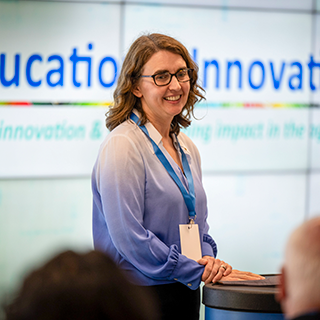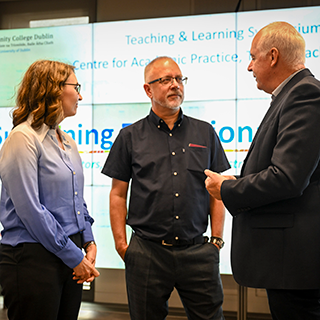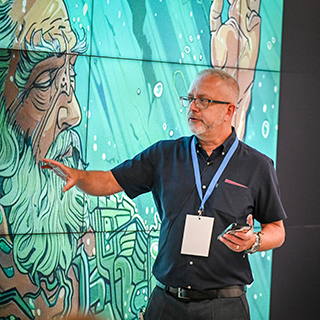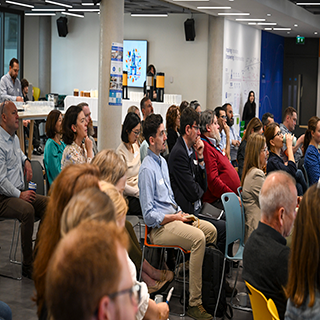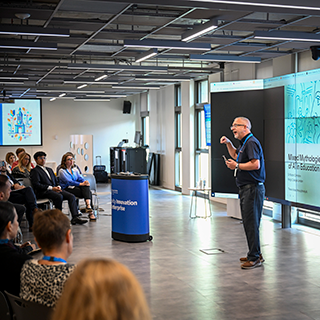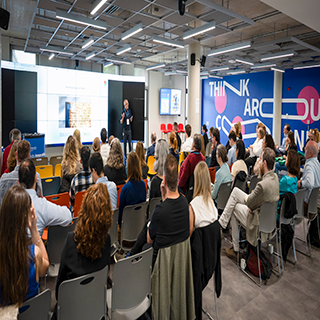Teaching & Learning Symposium 2025, SustAIning Educational Innovation
testOn Wednesday 28th May 2025, we hosted our Teaching & Learning Symposium 2025, bringing together colleagues from across Trinity to explore the theme of SustAIning Educational Innovation in the age of AI. A great day of thoughtful reflection, energising discussion and collaboration.
Highlights included:
- A thought-provoking keynote by Dr Martin Compton (King’s College London) on “Mixed Mythologies: Duality, Change and the Role of AI in Education”.
- Strategic insights from the Senior Lecturer and Dean of Undergraduate Studies, Prof Vinny Wade on the future direction of teaching and learning at Trinity.
- A rich programme of presentations and workshops featuring Trinity staff and students, showcasing learning innovations across the disciplines.
Teaching & Learning Symposium Programme 2025 (Download PDF)
Presentations and recordings are available below.
Keynote Speaker
Keynote Speaker: Dr Martin Compton, College Lead for AI and Innovation in Education, King's College London, King's College London.
AI inspires both promise and anxiety, urging us to rethink the foundations of education even as it destabilises long-held assumptions. In this keynote, Martin will explore the cognitive dissonance that generative AI provokes. Drawing on both Roman and Greek classical mythology, he uses figures such as Janus, the Roman god of thresholds and transitions, and Proteus, the shape-shifting Greek sea god, to frame AI as both a disruptive force and a potential vehicle (or catalyst) for transformation. Janus, who looks both backward and forward, might prompt us to reflect critically on conventional pedagogical practices while imagining radically different futures. Proteus embodies the volatility and fluidity of the AI landscape. AI's potential to adapt and reshape the contours of knowledge, teaching and assessment are set against its mutability and elusiveness. At the heart of his talk Martin will ask: What is the purpose of education in the age of AI? Have the purposes actually changed? What should we teach, and how? And what counts as meaningful assessment? With a nod to a less mythological Greek, Martin will invoke the Socratic paradox: “All I know is that I know nothing” as he argues for a nuanced, informed, forward-looking and reflective response to AI. Rather than react with fear or fatigue, educators can use this moment to catalyse long-needed shifts in curriculum, pedagogy and the design of teaching and learning.
Martin Compton Presentation 2025
Dr Martin Compton, Bio.
Dr Compton has been an educator for over 30 years, affording him ample time to realise that it takes a lifetime of teaching to get the hang of it. In that time, he has had the privilege of teaching children, young people and adults. His teaching has spanned secondary schools, international schools, further education colleges and universities both in the UK and overseas.
Having spent a number of years at the University of Greenwich and then UCL, in July 2023 he took up a post at King's College London where he was employed to lead on curriculum and assessment design but as it turned out he has spent most of his time looking at ways in which the opportunities and threats of AI will necessitate changes to pedagogy, assessment and feedback practices across higher education. He is now the College Lead for AI in Education which is giving him opportunity to help colleagues reflect on, critique and reimagine teaching and assessment design and other ways of elevating a 'freedom to learn' philosophy.
Strand 1: Impacting student learning through innovative practices
Assoc Prof Norah Campbell & Student, Amulya Sanagavaram, Trinity Business School.
This presentation explores how student reading groups and student audits of Trinity's rich open lectures/public talks are used to develop students’ skills in tackling national and global health challenges. As part of a 20 credit capstone module with Business students in Senior Sophister year, the Reading Group method is used in the first semester to immerse students in industries such as, ultra-processed foods, alcohol, tobacco and opioids, and their corporate political activities.
(No presentation available).
Assoc Prof Norah Campbell, Bio.
Dr Campbell's research is in the commercial determinants of health: measuring the ways business activities - subsidies, taxation, lobbying, marketing, product design and public relations - can impact the population and planetary health.
She is especially interested in where the problem of over-consumption ends and the problem of over-production begins.
Dr Jonathan Hodgers & Student, Mr Cathal Ahern, School of Creative Arts.
This presentation explores how a Senior Sophister undergraduate music module embeds ESD by examining the intersections of music and climate change. Through case studies on sustainable touring, eco-conscious music production, and climate-focused compositions, the course fosters critical thinking, industry awareness, and ethical reflection. This approach demonstrates how non-STEM disciplines can effectively engage with ESD themes, equipping students with the tools to shape a more sustainable future in the arts.
Jonathan Hodgers Symposium Presentation 2025(Download PDF)
Dr Jonathan Hodgers, School of Creative Arts, Bio.
Dr Jonathan Hodgers is a lecturer specialising in 20th-century music, with a particular emphasis on popular and vernacular traditions, as well as music’s impact on the environment. He earned his PhD in Music from Trinity College Dublin in 2014, where his dissertation, Dylan in Cinema, explored Bob Dylan’s influence on film.
His monograph, Bob Dylan on Film: The Intersection of Music and Visuals, was published by Routledge in 2024. He is an editorial board member of the biannual journal The Dylan Review. In addition to his work on Dylan, he has also contributed to research on student data as a strategic resource and graduate employability.
Jonathan is currently a Teaching Fellow in the Department of Music and was recently seconded to develop Trinity’s Education for Sustainable Development programme.
Mr Cathal Ahern, Student, Bio.
Cathal is a twenty-two-year-old student from Lucan, Co. Dublin.
In recently completing his Trinity Joint Honours Music & Modern Irish degree, he submitted a composition portfolio as his final capstone project.
He also has a keen interest in research areas including popular and traditional Irish music studies, and hopes to pursue music further following his graduation.
Dr Rachel Hoare, School of Languages, Literatures and Cultural Studies & Director of the Centre for Forced Migration Studies & Bernadette Rollins, Student, School of Languages, Literatures and Cultural Studies.
This presentation examines how using image-based prompts, in a Masters level module delivered in the School of Languages, Literatures and Cultures, entitled: 'Forced Migration and Identity: Reconstructed and Reimagined Futures', invites students to explore personal and cultural meanings of 'home' through visual association, encouraging deeper connections than text-based discussion alone.
Rachel Hoare Presentation 2025
Dr Rachel Hoare, Bio.
Rachel delivers language and linguistics modules in the French department, an elective on the human experience of forced migration, and a masters module on identity and forced migration, while also supervising student research in these areas. In addition to her academic role, she works part-time as an expressive arts psychotherapist with unaccompanied refugee minors and young adults for Tusla, the Irish Child and Family Agency.
Rachel's humanistic psychotherapy practice informs her teaching philosophy, and she endeavours to create inclusive learning environments that value individual potential. Rachel's research-led teaching methodology draws from relational and narrative pedagogy, experiential learning, and Universal Design for Learning principles, enabling her to creatively address diverse learner needs and preferences.
Strand 2: Generative AI in Education
Mr Gavan Drohan, Head of Entrepreneurship and Mr Zaur Samadov-Unsizade, Student Entrepreneurship Programme Manager, Trinity Innovation & Enterprise.
This presentation shows evidence of how entrepreneurship education fosters innovation by integrating creative thinking into faculty curricula. By introducing an AI mentor, which was designed to support students in building and refining their ideas, we will share how technology-driven mentorship can democratise entrepreneurship education, equipping students with the tools to transform their ideas into reality.
Trinity Innovation Presentation 2025
Mr Gavan Drohan, Bio.
Mr Gavan Drohan is responsible for the delivery of a full programme of activities to encourage and support innovation, including incubation and acceleration programmes such as LaunchBox for students at the start of their entrepreneurial journey, through to later stage pan European start-ups programmes supported by EIT.
His background encompasses tele-comms, innovation management and as a start-up founder. Prior to joining Trinity, he was a co-founder of Red Planet, an innovation consultancy which was acquired by Deloitte in 2017.
Mr Zaur Unsizada-Samadov, Bio.
Zaur leads innovation initiatives that empower students across all disciplines. With a background in ecosystem building, innovation policy, and start-up support from his previous role at the Innovation Agency Azerbaijan, Zaur now focuses on creating inclusive, interdisciplinary programmes like the Open Incubator (openincubator.ie).
He’s passionate about integrating entrepreneurship into non-traditional faculties, scaling support with AI mentorship tools, and helping early-stage founders turn ideas into real-world impact.
Ms Tracey O’Neill and Dr Lisa Kirwan, Assistant Professors, School of Nursing & Midwifery.
This teaching and learning innovation focused on integrating generative AI into undergraduate children's nursing education, transforming current teaching methodology and students' learning outcomes for these units of study. Twenty-two Junior Sophister children and general nursing students used AI-generated frameworks to understand renal and endocrine conditions and develop individualised nursing care plans based on realistic clinical scenarios for children with these problems.
Dr Lisa Kirwan, School of Nursing & Midwifery, TCD.
Lisa is an Assistant Professor in Children’s Nursing and PhD candidate at the School of Nursing and Midwifery TCD with a research focus on adolescent mental health.
Lisa has practiced as a Paediatric Intensive Care Nurse in Ireland, the United Kingdom and Saudi Arabia, bringing a wealth of international experience to her academic work. Lisa recently completed a Special Purpose Certificate in Teaching, Learning & Assessment for Academic Practice at TCD.
Lisa has a growing interest in using generative AI to enhance children’s nursing education, student engagement and clinical preparedness in an evolving healthcare landscape.
Tracey O’Neill, Assistant Professor in Children’s Nursing and a PhD student in The School of Nursing and Midwifery.
Tracey is a Registered Children’s Nurse, a Registered Nurse in Intellectual Disability, and a Registered Nurse Tutor. Tracey’s experiences include research in the fields of child and family health, domestic violence, children’s diabetes, and children’s diabetes technology, with expertise in carrying out research with children, using child-participatory research methods.
Tracey also has extensive supervisory and lecturing experience in the field of children’s nursing, on undergraduate and postgraduate children’s nursing programmes, and engaging in teaching activities using high-fidelity simulation.
Mr Andrew Costello, Disability Officer/ Assistive Technology Officer.
This presentation explores how inclusive and user-friendly generative AI tools can be used for notetaking and memory recall, common tasks that students with a disability may find challenging on a daily basis. These GenAI tools facilitate a novel approach to learning and comprehension of the subject matter, thereby enhancing student engagement in the module and improving learning outcomes.
Andrew Costello Presentation 2025
Mr Andrew Costello, Bio
Andrew has been working with the service since January 2008 gaining experience in a wide area of Assistive Technology devices and inclusive software. Assistive Technology is a broad field, ranging from the use of very simple technology - for example, your mobile phone or e-mail - to very complex technology, such as the use of voice recognition software or technology that will read aloud information from your computer screen. Andrew is also the services system manager with responsibility for the delivery and maintenance of all current Disability IT systems such as the Disability area of the my.tcd.ie portal (SITS) and student information desk portal (SID). Andrew has also worked in the private IT sector for 4 years gaining experience in a range of IT issues from desktop to server support.
Andrew has also completed an MSc in Computing (Universal Design and Assistive Technology) at the Dublin Institute of Technology and has completed research into the barriers to a successful transition of Assistive technology supports from an educational to a working environment. Andrew has also completed his BA in Management and Information Systems from Liverpool John Moores University and completed a study from the British occupational hygiene society in Ergonomics essentials.
Senior Lecturer’s Forum.
Senior Lecturer's Forum Presentation 2025
Professor Vincent Wade, Bio.
Professor Vincent Wade holds the established Professorial Chair of Computer Science (Est. 1990) in the School of Computer Science and Statistics, Trinity College Dublin and holds a personal Chair in Artificial Intelligence. He received BSc, MSc, and PhD degrees in Computer Science and is cofounder and former Director of the ADAPT Centre for AI & Digital Media Technology (www.adaptcentre.ie).
In 2024, he took up the position of Dean of Undergraduate Studies and The Senior Lecturer in Trinity College Dublin. In this role in the Academic Services Division, he oversees all undergraduate student progression and policies from college admittance to graduation. He also oversees Trinity Teaching and Learning which is responsible for academic policies (Teaching and Learning), Academic Affairs, The Centre for Academic Practice, Quality Office, Careers services and the Trinity Access Programme.
Workshops
Dr Kieran Higgins, Ulster University and Dr Alison Calvert, Queen’s University Belfast
Invite Only Workshop
Join Dr Kieran Higgins and Dr Alison Calvert as they introduce the CRAFTS methodology for embedding Education for Sustainable Development (ESD) into curricula. CRAFTS uses Design Thinking principles to support collaborative, values-driven curriculum design. The approach includes key stages like Co-Design, Theoretical Alignment, Learning Design, and more. It aligns with ESD theory and the UN Sustainable Development Goals, promoting active, transformative learning.
The workshop will explore how this framework can support Schools and programme teams at Trinity.
Dr Alison Calvert, Bio
Following a successful 10 year career in the national and international dairy industry, Dr Alison Calvert transitioned into education. She is currently a Senior Lecturer (Education) in Food Chemistry at Queen’s University Belfast, with a passion for making complex food science concepts accessible and engaging for her students. Her teaching philosophy is grounded in authenticity thus creating a dynamic and enriching learning experience for her students.
Alison’s current pedagogical research interests are focused on Education for Sustainable Development (ESD). She has a particular interest in curriculum design strategies and teaching methodologies essential for developing sustainability competencies in graduates, plus the development and delivery of ESD programmes designed to educate and support academics embed ESD principles into their practice.
Alison is a Senior Fellow of the Higher Education Academy and a Fellow of the Institute of Food Science and Technology (IFST). Her active participation in industry organisations such as the IFST UK Education and Professional Development Committee and the UK Food Safety Research Network Innovation Board reflects her commitment to professional growth and making meaningful contributions to both the food industry and academia.
Dr Kieran Higgins, Bio
Dr Kieran Higgins is a Lecturer in Higher Education Practice at Ulster University, specialising in the development of ESD in the curriculum and upskilling lecturers to support this work.
Kieran was previously a Lecturer (Education) in Sustainable Development at Queen’s University Belfast, where he was Programme Director of the MSc Leadership for Sustainable Development, the university’s 25-year flagship programme on sustainability.
As an internationally recognised scholar in the field of ESD, Kieran is passionate about creating inclusive opportunities for students to develop as change agents for a more sustainable future. Kieran is a Senior Fellow of the Higher Education Academy.
Dr Martin Compton, King’s College London, Dr Ana Schalk and Kevin O’Connor, Centre for Academic Practice.
No presentation available.

